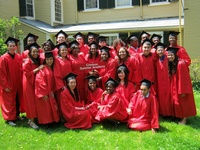CSA started in 2004 as part of the Harvard Financial Aid Initiative, which eliminated family contributions for full-year students with incomes less than $40,000 and boosted recruitment of low-income students.
“The programs have evolved with what the needs are and have helped CPS’s efforts to address the achievement gap and inspire students,” says Thomas J. Lucey, Harvard’s director of community relations for Cambridge, speaking about both CSA and CHSA. Rodburg says that CSA aims to expose students to college opportunities and help them prepare to apply.
“It’s not a pipeline to Harvard but a pipeline to increase the opportunity of higher education at highly selective institutions among local students,” Rodburg says.
Since graduating its first class in 2007, CSA has helped nine of its graduates enroll at Harvard. Students have also attended other Ivy League schools and top-tier universities. For the first time, CSA students are headed to the west coast this year: two students will attend Stanford in the fall.
Rodburg takes CSA students on New England college road trips during February and April break.
Sealy says that before going on the trip, his top priority for a college was that it have a city campus. But as soon as he stepped off the bus at Williams College, he fell in love with the rural atmosphere.
“You never know what you’ll miss out on,” says Sealy, who will matriculate at Williams in the fall.
Doreen M. Kelly-Carney ’85, a college counselor for CSA who previously worked as a Harvard admissions officer and a freshman proctor, says the exposure to other schools is one of the key components of CSA. Last summer, she advised Eda Kaceli, a senior at Boston Latin School, to keep Harvard on her wish list.
“I didn’t think I would get into Harvard, but [Kelly-Carney] was very encouraging. That was exactly what I needed to hear,” says Kaceli, who applied to 15 schools. She was admitted to Harvard, which was her first choice, and will enroll in the fall.
Even though many of the students in the program live in Cambridge, some had not visited Harvard’s campus before CSA.
Tobias J. Estime ’13, a first-generation college student, did not consider applying to Harvard until after his third summer at CSA.
“[CSA] helped me direct my focus to colleges and universities, particularly liberal arts,” Estime says. “I thought to myself, well, if I get in, I’ll be excited, but if not I’m applying to nine other schools.”
CSA requires students to take a college preparatory class and teaches them about interviews, essays, and the Common Application.
A major difficulty in creating the program, Rodburg says, was crafting a curriculum that would not overlap with any of the 34 Boston and Cambridge schools from which CSA accepts students.
In the first year of the program, students take a quantitative reasoning course, a writing course, and an elective, and in the following summer, they can choose a science course and other electives. In the third year, students choose their own math and expository writing courses offered through the Harvard Summer School.
Read more in News
New Book by HBS Professor Advocates for Downtime













